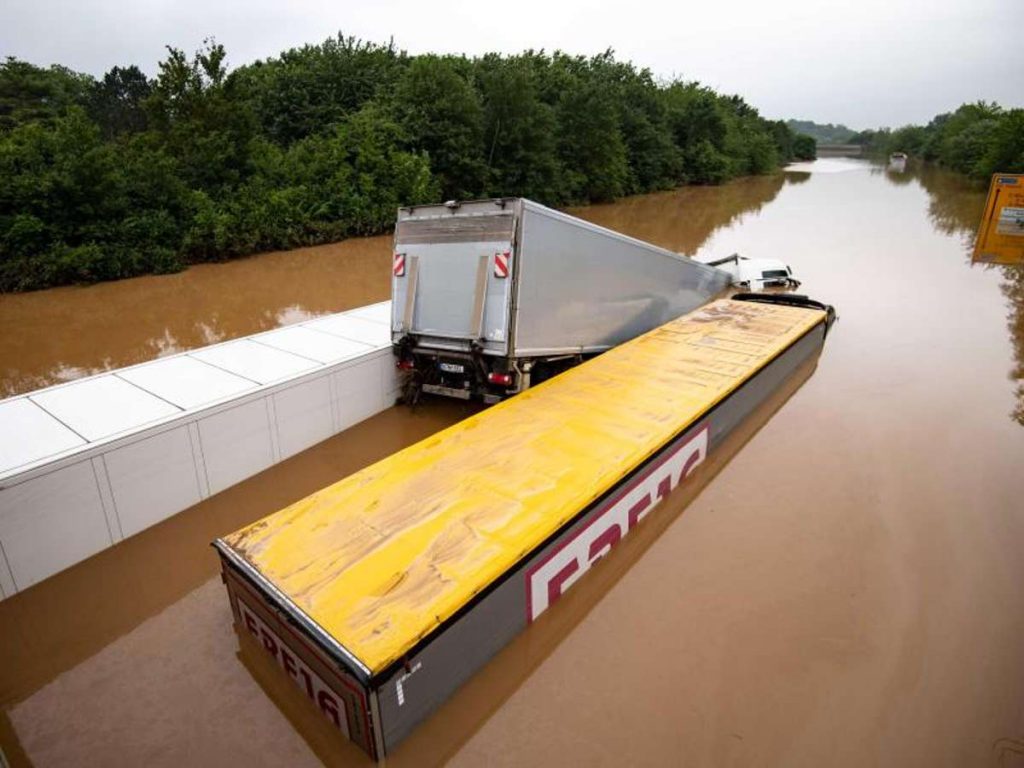
Germany floods: more than 100 deaths in western Germany
In Erfststadt-Blissme, southwest of Cologne, landslides of gigantic proportions occurred on Friday, huge holes formed in the ground. Houses were swept away and collapsed. “There are deaths,” said a spokeswoman for the Cologne county government. The situation is still puzzling.
According to police reports, just under 100 people are missing in the Rhineland-Palatinate, Interior Minister Roger Levents said on the Deutschlandfunk website in the morning. Hours of torrential rain led to devastating floods in several areas. The governments of the two federal states involved met in private.
According to the Federal Office for Population and Disaster Control (BBK) in Bonn, 23 cities and regions have been affected by floods in North Rhine-Westphalia. The Interior Ministry there reported 43 dead. The fire brigade rescued three seriously injured people from the Worm River in the Heinsberg district on Thursday evening, who were in danger of drowning.
In the Rhineland-Palatinate, the Ahrweiler region was the epicenter of the disaster. In the village of Schuld an der Ahr alone, with a population of 700, many houses, and many other buildings, some of them badly damaged, were washed away by large amounts of water. At least 362 people were injured in the Ahrweiler district alone. Police in Koblenz announced on Friday that that number could rise further.
This also applies to the dead, whom the Ministry of the Interior of the Rhineland-Palatinate gave 63 dead.
Severe damage was also inflicted in other areas of Eifel as well as in the Trier-Saarburg region.
Prime Minister Malu Drerer (Social Democratic Party) said federal aid is needed to rebuild the affected areas. “It is very clear that this disaster cannot be dealt with by the state alone, and certainly not by the municipalities,” she emphasized in the ZDF newspaper “Morgenmagazin”.
In rivers and lakes in Baden-Württemberg, experts predicted a rise in water levels on Friday. In some areas roads were closed again, and in Allgäu a residential area was flooded. The German Met Office has warned of heavy rain and thunderstorms, for example in the Upper Swabia region. The water level can rise quickly, especially in smaller bodies of water.
The Rhineland-Palatinate State Environment Office reported in its early warning system as of Saturday morning that there is a low risk of flooding in almost the entire state. She added that isolated flooding could still occur in the area around the river and parts of the Eifel River.
Water levels are expected to fall in North Rhine-Westphalia, but sometimes this will only happen slowly. Water levels were often still above warning thresholds, for example in Erft, Ruhr, Rur, Sieg and Weser, the state environment agency announced.
In the Upper Rhine, persistent strong flooding will slow ships for several days, according to the Office of Waterways and Shipping (WSA) in Freiburg. “According to the current situation, the release of cargo can only be expected from the beginning of next week,” the authority said on Friday. Take care of the waterway between Weil am Rhein on the border with Switzerland and the area between Mainz and Ginsheim (Hesse).
Train traffic is severely restricted
Train traffic in North Rhine-Westphalia and Rhineland-Palatinate is still heavily affected. Deutsche Bahn announced on Friday that many roads are completely closed or can only be used on a limited basis. “The water masses have severely damaged tracks, points, signal technology, train stations and signal boxes in many parts of North Rhine-Westphalia and Rhineland-Palatinate.” In North Rhine-Westphalia alone, trails with a length of about 600 kilometers are affected. For long-distance traffic, among others, the Cologne-Wuppertal-Hagen-Dortmund section is not currently accepted.
Prime Minister Laschet said the day before at the ZDF “Maybrit Illner” program that ways must be found to get roads, bridges and other infrastructure back on very quickly. It will help the country, but “a major national effort is also needed so that the worst things can be quickly eliminated.”
Bonn citizens offer accommodation
Following a call from the city of Bonn to provide housing for people from flood areas, the department has received offers of assistance for more than 1,000 affected people. The city announced Friday that many individuals wanted to accommodate up to three people, and hotels offered up to 50 double rooms. Mayor Katja Dorner explained, “We’ve been overwhelmed by the diversity and abundance of offerings. We don’t need more at the moment.”
From now on, phone lines should remain free for those who seek help. In addition, a city employee is looking for four large group accommodations to show the people there about the offer. Flood victims from neighboring heavily affected areas of Bonn such as Ahrweiler, Euskirchen and Rhein-Sieg were addressed.
The city of Königswinter also called on its citizens on Friday to provide free living space for flood victims for a transitional period. “It could be a room in a shared flat, an unused guest room, an apartment, a basement apartment, or a vacation home that is currently vacant,” she said in a letter.
Germany’s neighbors are also suffering from floods. In Switzerland, rivers rose sharply after heavy rains. According to Keystone-sda news agency, streams overflowed the villages of Schleitheim and Beggingen in the canton of Schaffhausen. Large amounts of water flowed through the streets, into basements, carried vehicles and destroyed small bridges.
In Belgium, people from some communities have been brought to safety along the Meuse River as a precaution, the Belga news agency reported.
© dpa-infocom, dpa: 210716-99-401400 / 20

“Coffee trailblazer. Social media ninja. Unapologetic web guru. Friendly music fan. Alcohol fanatic.”
